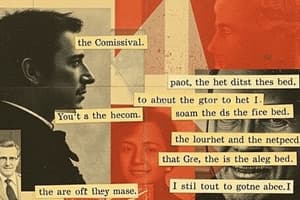Podcast
Questions and Answers
What is the abbreviation ANCAP referring to?
What is the abbreviation ANCAP referring to?
- Australian New Car Auction Program
- Australian National Car Association Program
- Australian New Car Assessment Program (correct)
- Australian New Car Advertising Program
What is the purpose of an RWC?
What is the purpose of an RWC?
- To ensure a car has a valid insurance policy
- To ensure a car is roadworthy (correct)
- To ensure a car has a valid driver's license
- To ensure a car has a valid registration
What is the main function of an ABS?
What is the main function of an ABS?
- To increase the speed of a car
- To improve the fuel efficiency of a car
- To enhance the entertainment system of a car
- To assist in braking by preventing wheel lockup (correct)
What is the main purpose of SRS in a vehicle?
What is the main purpose of SRS in a vehicle?
What is the main difference between RACV and RACQ?
What is the main difference between RACV and RACQ?
What is the primary purpose of ESP in a vehicle?
What is the primary purpose of ESP in a vehicle?
What is the main function of SRS in a vehicle?
What is the main function of SRS in a vehicle?
What is the primary function of an ABS?
What is the primary function of an ABS?
Flashcards are hidden until you start studying
Study Notes
Ambition
- Macbeth's ambition is a key driving force behind the plot
- Initial ambition is to become Thane of Cawdor, but later becomes a desire for the throne
- Lady Macbeth's influence and manipulation fuel Macbeth's ambition
- Ambition leads to a downward spiral of moral compromise and destruction
Guilt
- Guilt is a major theme, particularly in Macbeth's character
- Macbeth's guilt is evident in his hallucinations, paranoia, and insomnia
- Guilt stems from the murder of King Duncan and the consequences that follow
- Lady Macbeth also experiences guilt, but it is suppressed by her denial and rationalization
Fate
- Fate is a significant theme, raising questions about the role of destiny in human life
- The witches' prophecies set the events of the play in motion, suggesting a predetermined course
- Macbeth's fate is sealed when he chooses to fulfill the prophecies, leading to his downfall
- The concept of fate is often contrasted with the idea of free will, leaving the audience to ponder the nature of responsibility
Power
- Power is a corrupting influence, as seen in Macbeth's transformation from a noble thane to a ruthless tyrant
- The pursuit of power leads to a disregard for morality and the well-being of others
- Macbeth's desire for power is driven by his ambition and fueled by the prophecies
- The abuse of power leads to chaos, destruction, and ultimately, Macbeth's downfall
Responsibility/Blame
- The play raises questions about who is responsible for the tragic events that unfold
- Macbeth and Lady Macbeth both share responsibility for their actions, but they also shift blame onto others
- The witches' prophecies and supernatural influence can be seen as a catalyst for the events, but ultimately, human decisions and actions lead to the tragic outcome
- The play suggests that individuals must take responsibility for their actions, rather than blaming external factors
Supernatural Influence
- The supernatural elements, including the witches and their prophecies, set the tone for the play
- The witches' prophecies create a sense of foreboding and inevitability, influencing Macbeth's decisions
- The supernatural is used to explore the themes of fate, power, and morality
- The supernatural elements also serve to heighten the sense of tension and drama in the play
Deception
- Deception is a key element of the play, particularly in Macbeth's and Lady Macbeth's relationship
- Macbeth and Lady Macbeth deceive others, including King Duncan, Banquo, and Macduff, to achieve their goals
- Deception is also used to mask one's true intentions and emotions, as seen in Lady Macbeth's manipulation of Macbeth
- The play suggests that deception can lead to a breakdown in trust and relationships, ultimately contributing to the downfall of the characters
Ambition
- Drives the plot of Macbeth
- Initially, Macbeth's ambition is to become Thane of Cawdor, but later shifts to desiring the throne
- Influenced and manipulated by Lady Macbeth
- Leads to moral compromise and destruction
Guilt
- A major theme, especially in Macbeth's character
- Evident in Macbeth's hallucinations, paranoia, and insomnia
- Stems from the murder of King Duncan and its consequences
- Lady Macbeth also experiences guilt, but suppresses it with denial and rationalization
Fate
- Raises questions about the role of destiny in human life
- The witches' prophecies set the events of the play in motion, suggesting a predetermined course
- Macbeth's fate is sealed when he chooses to fulfill the prophecies, leading to his downfall
- Contrasts the idea of fate with free will, leaving the audience to ponder responsibility
Power
- A corrupting influence that transforms Macbeth from a noble thane to a ruthless tyrant
- Leads to a disregard for morality and the well-being of others
- Driven by Macbeth's ambition and fueled by the prophecies
- Abuse of power leads to chaos, destruction, and ultimately, Macbeth's downfall
Responsibility/Blame
- Raises questions about who is responsible for the tragic events
- Macbeth and Lady Macbeth share responsibility for their actions, but shift blame onto others
- The witches' prophecies and supernatural influence act as a catalyst, but human decisions lead to the tragic outcome
- Emphasizes that individuals must take responsibility for their actions, rather than blaming external factors
Supernatural Influence
- Sets the tone for the play with elements like the witches and their prophecies
- Creates a sense of foreboding and inevitability, influencing Macbeth's decisions
- Explores themes of fate, power, and morality
- Heightens the sense of tension and drama in the play
Deception
- A key element of the play, particularly in Macbeth's and Lady Macbeth's relationship
- Macbeth and Lady Macbeth deceive others, including King Duncan, Banquo, and Macduff, to achieve their goals
- Used to mask true intentions and emotions, as seen in Lady Macbeth's manipulation of Macbeth
- Leads to a breakdown in trust and relationships, contributing to the characters' downfall
Australian Automotive Acronyms
- ANCAP stands for Australian New Car Assessment Program.
- RWC stands for Road Worthy Certificate, which ensures a vehicle is safe to operate on public roads.
- ABS stands for Anti-lock Braking System, a safety feature that prevents wheels from locking up during hard braking.
Airbag and Stability Systems
- SRS stands for Supplementary Restraint System, which includes airbags and other safety features.
- ESP stands for Electronic Stability Program, a system that helps the vehicle stay stable and on course.
Automotive Organizations
- RACV stands for Royal Automotive Club of Victoria.
- VACC stands for Victorian Automotive Chamber of Commerce.
- RACQ stands for Royal Automotive Club of Queensland.
Miscellaneous
- SMC stands for St Monica's College, which is not directly related to the automotive industry.
Australian Automotive Acronyms
- ANCAP stands for Australian New Car Assessment Program.
- RWC stands for Road Worthy Certificate, which ensures a vehicle is safe to operate on public roads.
- ABS stands for Anti-lock Braking System, a safety feature that prevents wheels from locking up during hard braking.
Airbag and Stability Systems
- SRS stands for Supplementary Restraint System, which includes airbags and other safety features.
- ESP stands for Electronic Stability Program, a system that helps the vehicle stay stable and on course.
Automotive Organizations
- RACV stands for Royal Automotive Club of Victoria.
- VACC stands for Victorian Automotive Chamber of Commerce.
- RACQ stands for Royal Automotive Club of Queensland.
Miscellaneous
- SMC stands for St Monica's College, which is not directly related to the automotive industry.
Studying That Suits You
Use AI to generate personalized quizzes and flashcards to suit your learning preferences.




